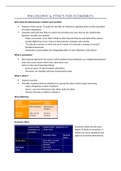PHILOSOPHY & ETHICS FOR ECONOMICS
Why study the link between markets and morality?
Purpose of the course: To study the morality of markets by applying ethics to the evaluation
of market institutions
Concepts and tools that help you when you develop your own view on the relationship
between morality and markets
- Major economists, from Adam Smith to John Maynard Keynes and Nobel Prize winner
Joseph Stiglitz have clear views on links between markets and morality
- “To educate a person in mind and not in morals is to educate a menace to society”
Theodore Roosevelt
- Awareness is precondition for integrating ethics in own reflections and choices
What is economics?
Neo-classical approach: the science which studies human behavior as a relationship between
ends and scarce means which have alternative uses
(Scarce is the most important thing)
- Ends are given disconnection with ethics
- All means are tradable and have instrumental value
What is ethics?
Study of morality
Morality: standards that an individual or a group has about what is right and wrong
- Values (happiness, justice, freedom)
- Norms: concrete behavioral rules (thou shall not steal)
- Virtues: (honesty, prudence, industry)
Moral dilemma
Economic ethics
Economic ethics has the same
object of study as economics. It
reflects on moral standards that
apply to economic phenomena.
,Economics vs ethics: descriptive vs. prescriptive statements
Economics makes descriptive or positive statements about the company knowledge about
“what is”
Ethics: makes prescriptive or value/normative statements knowledge of “what ought to
be done”
Both are connected. Any policy advice is derived from:
- Value statement: the government should foster goal x
- Positive statement: x is most efficiently realized by using policy instrument y
- Policy advice: use policy instrument y
Example 1
1. Value statement: human happiness is an important goal
2. Positive statements:
- Unemployment has a strong negative impact on human happiness
- Abolishing tax on dividends will attract multinational companies and reduce
unemployment
3. Policy advice: The tax on dividends should be cancelled
Example 2
1. Value statement: child labor is legitimate if it contributes to welfare in the long run (Norberg)
2. Positive statements:
- Child labor reduces the cost of production and increases the competitiveness of
developing countries
- In the long run, the resulting rise in welfare will diminish child labor
Policy conclusion: Western companies should not force their suppliers in developing
countries to refrain from using child labor
On what values are the classical defenses of the free market based?
John Locke: the free market economy respects the right of freedom and the right to private
property
Adam Smith: the free market economy will produce the greatest benefits
- Labor division generates higher productivity and innovation
- Prices tend to the lowest possible level
- Competition generates efficient allocation
“No society can surely be flourishing and happy, of which the far greater part of the
members are poor and miserable”
Was Adam Smith right?
Success of the market
- France 1780: life expectancy was 25 years
- 4/5 of French families devoted 90% of
their income to bread
- Income has risen by 1500% since then
,Theory of unintended consequences
Greatest benefits are realized by self-interest of economic agents
- The businessman “neither intends to promote the public interest, nor knows how much
he is promoting it… he intends only his own gain, and he is in this, as in many other
cases, led by an invisible hand to promote an end which was no part of his intention. Nor
is it always the worse for the society that it was not part of it. By pursuing his own
interest he frequently promotes that of the society more effectually than when he really
intends to promote it.” (Adam Smith, Wealth of Nations)
Criticism on free market economy
Efficiency
- Companies have an incentive to reduce competition
- Negative externalities (e.g. pollution) self interest is not always
socially efficient
Other ethical values
- Justice: free markets generate unequal income distribution
(Piketty)
Oxfam Nobib: 1% richest own twice as much as the rest of
world population
Two models of capitalism
Anglo Saxon model (UK, US)
- Free market operation
- Government secures private property and contract rights, but does
not intervene or regulate the economic process
- Shareholder model for companies: maximize stock value (bonus system for managers)
Rhineland model (Germany, France)
- Market operation, but within some limits
- Government regulates the market and provides for welfare state
- Stakeholder model for companies: balance of interests of stakeholders
Shareholders, employees, customers, suppliers, governments, society
Greenspan on free markets and the credit crisis in 2008
“I made a mistake in presuming that the self-interests of organizations, specifically banks and
others, were such that they were best capable of protecting their own shareholders and their
equity in firms”
, Purpose and learning goals of the course
Purpose: To study the morality of markets by applying ethics to the evaluation of market
institutions
Learning goals:
1. Knowledge of main ethical theories: memorize and define / compare and contrast /
distinguish
- Utilitarianism
- Duty, rights and justice ethics
- Virtue and care ethics.
2. Apply ethics to critically reflect on economic institutions and policies: apply concepts,
combine with results of economic research, analyze
3. Develop and argue an own moral position on market institutions and policies: evaluate
and appraise, synthesize
4. Communicate the results of the reflection in a scholarly, clear, and comprehensive way:
write, present, defend





